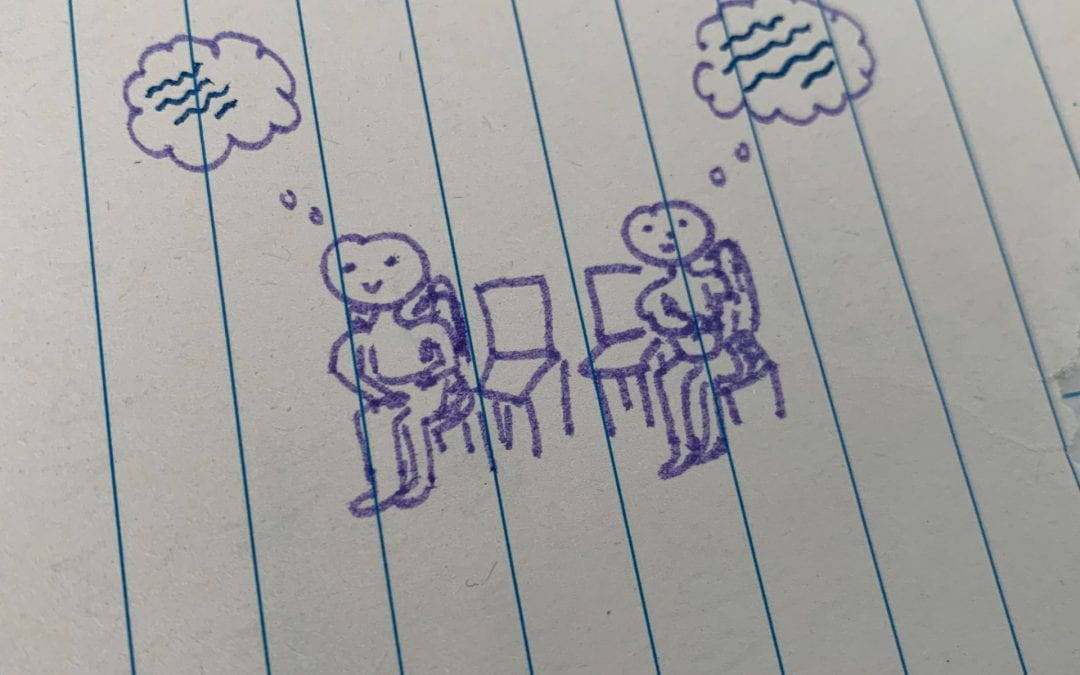I read quite a bit over the inter-semester break, listening to podcasts and the radio too. These are all forms of conversations; opening up your mind to someone else and taking out some of its contents, holding them up to the light for the other person to see. It’s a moment of vulnerability, of curiosity, of learning something new. In the books I’ve read over the past few weeks, I’ve seen many lines and ideas that I touch on in conversation. Over and over, I see articles popping up: how to have a good conversation. But I think the starting point should be to have one. Where do we start? How do we have conversations, versus exchanges of ‘good thanks how about you?’
One of my lecturers, Paula Morris, said we are like suitcases, carrying a bundle of experiences, stories, items with us, that are a part of us. Emily Carr, the Canadian artist and writer, wrote about self-consciousness. “Why do people restrain themselves?” she asked, along the lines of this. “We talk of weather, our ailments, of food. They shut the door of their insides and I shut the door of mine.”
Of course, small talk isn’t entirely bad. You don’t want to necessarily have a forty-five minute conversation with every person you sit next to or open a door for. But I think all of us have been amazed at some point or another, losing track of space and time and relishing in what another person has to say, agreeing or disagreeing or agreeing to disagree. We live in a country with no COVID, no masks (thankfully). We should enjoy having all the benefits of human interaction that so many other places can’t.
I want to circle back to university, because this is a university blog, and also because the opportunity we have is so rare. University is one of the few times your path will be aligned to that of so many people. Later, we’ll have to set time aside for our friendships. Inevitably, they’ll narrow. We’ll rarely have the opportunity again of mingling with hundreds of people who are at the same stage of life as we are: to learn. We rub shoulders with hundreds of people, sit in class with strangers whose suitcases must be packed to the brim. It’s become normal to leave a seat between each person, to go on your phone if you’re by yourself, to treat people as strangers instead of books you may learn something from. You have nothing to lose. Worst case scenario, it’s not great, and you probably won’t see them again, or at most, will only see them sitting elsewhere.
I see many podcasts about having a good conversation, asking the right questions. Someone told me there are two main things that are helpful to keep in mind: listen, and ask yourself how you can be of service to this person/what you can learn from them. Ask them about their experiences and meet them halfway with your own. But I think the starting point is to be open to a conversation, and not just small talk.
I hope we have a bigger conversation around having conversations. There are probably hundreds of thousands of people who have the material to write a book, but only a few hundreds will ever get around to getting it down. In the meantime, a conversation with them can open up your world to the worlds they carry within them. The American interviewer and author Studs Terkel interviewed bellboys, porters, presidents, doctors, the famous writers alive at the time, celebrities, athletes, academics, and so on. What set him apart was that he treated everyone from factory workers to prime ministers with the same respect, the same admiration for their work, the same deep curiosity for whatever they shared.
Maybe it’s about listening. An inner openness, a receptiveness to what the other might offer. Don’t worry about impressing anyone or giving off a certain energy, and treat the people you talk to like authors you would interview. What kind of objects are in their suitcase? What might you learn from the lifetime compressed in the person? You have a chance to talk to them in the present, instead of reading their book and satisfying yourself with whatever the interviewer asked them, or what they got on the page. It’s an opportunity I think we take for granted.
